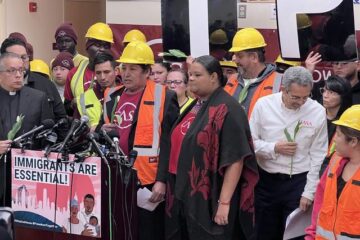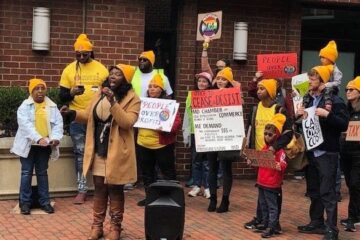La jueza Erika Aifán. Photo: oacnudh.org.gt
On January 16, in a statement, the US Department of State (USDOS) expressed concerns about the deteriorating judicial system in Guatemala, condemning the request filed by the Public Ministry (MP) on January 13 for a preliminary hearing to remove the judicial immunity of Judge Erika Aifán as “a blatant effort to obstruct investigations into corruption and an affront to the integrity of Guatemala’s highest courts.” The MP, in an announcement published to twitter, accuses Aifán of “abuse of authority and breach of duty” related to her overseeing of the 2020 Parallel Commissions Case. Five days later, on January 18, the MP released another request for a preliminary hearing against Aifán for the same crimes, as well as “prevarication” related to the Odebrecht Case. In an atmosphere of increasing criminalization of judicial officials, Aifán stands to lose her judicial immunity and could face prison time for her alleged crimes. But according to Aifán, these charges are false. “I have not committed any crime,” she explained.
Awarded the “Women of Courage Award” from USDOS in 2021, Aifán is internationally recognized for her work as an independent judge and is identified by the USDOS as “an icon in Guatemala in the fight against corruption, efforts to increase transparency, and actions to improve independence in the justice sector.” Since 2016, she has suffered harassment and threats for her work as a judge; the Inter-American Commission on Human Rights granted her protective measures in 2019, ordering the State of Guatemala to guarantee her safety. For Congresswoman Norma Torres, it is “unacceptable that Judge Aifán and her family have to face violent threats because she is fulfilling her oath to uphold the law.” Others have come forward, as well, in support of Aifán, warning of the broader implications for the justice system. The Central American Federation of Judges for Democracy explained that the MP aims “to criminalize her and her judicial performance which will weaken the fight against corruption and impunity.” According to lawyer Ramon Cadena, Aifán’s losing her immunity would mean»the end of judicial independence in Guatemala.»
Survivors of Atrocities During the Armed Conflict Could See Justice Next Week
The trial of five former members of the Civil Defense Patrol accused of sexual violence and crimes against humanity against 36 Maya Achi women wrapped up this week. On January 19, after twelve days of presenting evidence, the prosecution and defense delivered their closing arguments. Judge Yassmin Barrios will announce the verdict on January 24. After 40 years, these brave women–who tenaciously fought delays and discrimination along the way–hope to find justice for the egregious crimes committed against them. As explained by their legal representative Haydeé Valey of the Rabinal Legal Clinic, “The survivors of the Mujeres Achi case are teaching us that it is possible to shed shame, overcome fear and break the silence, and that forgetting will never be an option.”
Meanwhile, a few floors below in the Tribunal Tower, two other transitional justice cases continued: the Death Squad Dossier and the Tactic Case. The “Death Squad Dossier” refers to an army logbook that came to light in 1999. The logbook was used by military intelligence to track 183 forced disappearances of political dissidents between 1983 and 1985. On the morning of December 18, Judge Angel Gálvez ruled to send retired general Victor Augusto Vásquez Echeverría to trial for the forced disappearance of 14 people. The trial of José Manuel Castañeda Aparicio–accused of the forced disappearance of three people from the municipality of Tactic in the department of Alta Verapaz in 1983–resumed January 19. Carlos Juarez, of the Mutual Support Group, shared his hope that “the victims finally have access to justice and truth» which is the only way to prevent these atrocities from repeating.

Displaced Community Calls Out State Inaction and Failure to Comply with IACHR
In a protest outside of the Presidential Palace, community members of the displaced community of Laguna Larga condemned the lack of government action on their case. Nearly five years prior, 115 families were forcibly removed from their homes by police and military. With no other option, the community settled on a strip of land near the Mexican border, but according to the IACHR, in their current living arrangement, they are exposed to “extremely unhealthy and unsanitary conditions.” Four community members have died of health issues associated with the current living situation and now, given the COVID-19 pandemic, the situation of health and safety for the community has grown even more precarious.
In 2017, following their violent eviction from land they had lived on for over 30 years, the community members received precautionary measures from the Inter-American Commision on Human Rights (IACHR). The IACHR ruled that the situation in which the community was forced to live violated several of their human rights, including the right to water, housing, and education; the IACHR ordered the Guatemalan State to find a solution. With no solution in sight, the IACHR issued a follow-up resolution this past December, expressing willingness to “conduct a new visit to Guatemala in order to establish a space for dialogue to address the challenges identified in the implementation of the measures.” Community members and their legal representation from the Human Rights Law Firm reiterated the responsibility of the state to comply with the IACHR and demanded “ a viable and definitive solution.”
COVID-19 Policies Block Asylum Seekers from Reaching the US
On January 17, Guatemalan authorities pushed back a caravan of over 600 migrants en route to the United States. The caravan–composed mostly of Hondurans and Nicarguans, with minors comprising about a quarter of the group–had left from the San Pedro Sula bus terminal two days earlier. Video footage reveals Guatemalan police clad in riot gear blocking the migrants from crossing the border. According to authorities, the migrants lacked “the proper health requirements” of proof of vaccination and a negative COVID test to enter Guatemala that came into effect on January 10. Guatemalan Migration Institute Director Carlos Emilio Morales explained, «We are protecting our borders; we are protecting the health of all Guatemalans.»
Similarly, the US has justified policies that prevent migrants from seeking asylum in the name of public health. For example, Public Health Order Title 42–first implemented in March 2020 by the Trump Administration–allows US border authorities to expel migrants without first screening them for asylum. On January 19, representatives of the Biden administration vigorously defended Title 42 in a hearing at the DC Circuit Court of Appeals. The hearing is part of a lawsuit filed by the American Civil Liberties Union (ACLU) that argues the policy violates the right of migrants to seek asylum and will determine whether or not the administration can continue this policy. ACLU lawyers pointed to the violence from which migrants are forced to flee and the brutal conditions they face along the way in search of asylum. Sharon Swingle, a Justice Department lawyer representing the Biden administration, explained that the administration is “aware of the deplorable and horrific circumstances,” and “the government’s goal is to get back to a state of orderly immigration processing for everyone, but currently, in the CDC’s view, the public health realities don’t permit that.”
Since March of 2020, the US has expelled more than a million migrants under 42. In a recently released report, Human Rights First found nearly 9,000 reports of kidnappings and other violent attacks against people who had been expelled to Mexico or blocked from seeking protection in the US. Gillian Triggs, Assistant High Commissioner for Protection, explained, “The UNHCR has been clear: it is possible for a country both to protect the public health of its people and to ensure access to territory for people forced to flee their homes. Measures restricting access to asylum must not be allowed to become entrenched under the guise of public health.”




